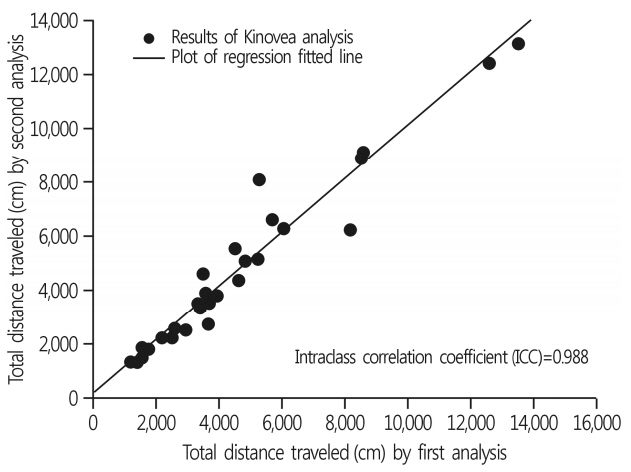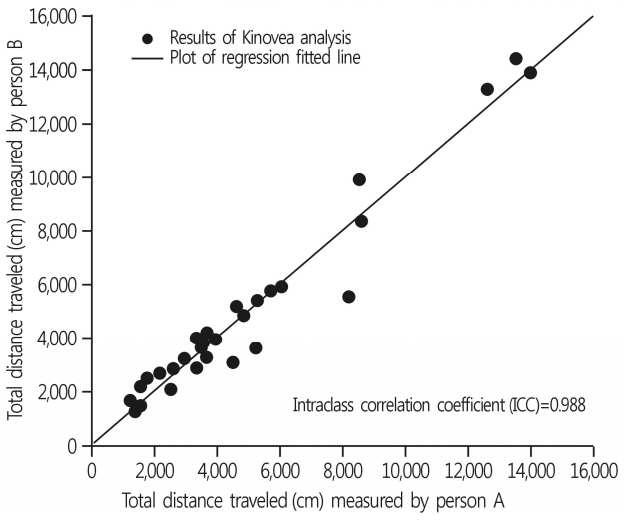Yeungnam Univ J Med.
2018 Jun;35(1):63-69. 10.12701/yujm.2018.35.1.63.
Reliability and validity of free software for the analysis of locomotor activity in mice
- Affiliations
-
- 1Department of Pediatrics, College of Medicine, Kosin University, Busan, Korea.
- 2Department of Psychiatry, Pusan National University Hospital, Busan, Korea. esmun@hanmail.net
- 3Department of Psychiatry, Pusan National University School of Medicine, Busan, Korea.
- KMID: 2415735
- DOI: http://doi.org/10.12701/yujm.2018.35.1.63
Abstract
- BACKGROUND
Kinovea software that tracking semi-automatically the motion in video screen has been used to study motion-related tasks in several studies. However, the validation of this software in open field test to assess locomotor activity have not been studied yet. Therefore, this study aimed to examine the reliability and validity of this software in analyzing locomotor activities.
METHODS
Thirty male Institute Cancer Research mice were subjected in this study. The results examined by this software and the classical method were compared. Test-retest reliability and inter-rater reliability were analyzed with Pearson's correlation coefficient and intraclass correlation coefficient (ICC). The validity of this software was analyzed with Pearson's correlation coefficient.
RESULTS
This software showed good test-retest reliability (ICC=0.997, 95% confidence interval [CI]=0.975-0.994, p < 0.001). This software also showed good inter-rater reliability (ICC=0.987, 95% CI=0.973-0.994, p < 0.001). Furthermore, in three analyses for the validity of this software, there were significant correlations between two methods (Pearson's correlation coefficient=0.928-0.972, p < 0.001). In addition, this software showed good reliability and validity in the analysis locomotor activity according to time interval.
CONCLUSION
This study showed that this software in analyzing drug-induced locomotor activity has good reliability and validity. This software can be effectively used in animal study using the analysis of locomotor activity.
Figure
Reference
-
1. Tosini G. Locomotor activity in rodents. Methods Mol Biol. 2007; 362:95–101.
Article2. Gray VC, Hughes RN. Drug-, dose- and sex-dependent effects of chronic fluoxetine, reboxetine and venlafaxine on openfield behavior and spatial memory in rats. Behav Brain Res. 2015; 281:43–54.
Article3. Roybal K, Theobold D, Graham A, DiNieri JA, Russo SJ, Krishnan V, et al. Mania-like behavior induced by disruption of CLOCK. Proc Natl Acad Sci U S A. 2007; 104:6406–11.4. Machado DG, Cunha MP, Neis VB, Balen GO, Colla A, Grando J, et al. Fluoxetine reverses depressive-like behaviors and increases hippocampal acetylcholinesterase activity induced by olfactory bulbectomy. Pharmacol Biochem Behav. 2012; 103:220–9.
Article5. Bondar NP, Lepeshko AA, Reshetnikov VV. Effects of early-life stress on social and anxiety-like behaviors in adult mice: sex-specific effects. Behav Neurol. 2018; 2018:1538931.
Article6. Niikura K, Ho A, Kreek MJ, Zhang Y. Oxycodone-induced conditioned place preference and sensitization of locomotor activity in adolescent and adult mice. Pharmacol Biochem Behav. 2013; 110:112–6.
Article7. Walsh RN, Cummins RA. The open-field test: a critical review. Psychol Bull. 1976; 83:482–504.
Article8. Machado DG, Bettio LE, Cunha MP, Capra JC, Dalmarco JB, Pizzolatti MG, et al. Antidepressant-like effect of the extract of Rosmarinus officinalis in mice: involvement of the monoaminergic system. Prog Neuropsychopharmacol Biol Psychiatry. 2009; 33:642–50.
Article9. Jung SH, Park JM, Moon E, Chung YI, Lee BD, Lee YM, et al. Delay in the recovery of normal sleep-wake cycle after disruption of the light-dark cycle in mice: a bipolar disorderprone animal model? Psychiatry Investig. 2014; 11:487–91.
Article10. Zhang JJ, Kong Q. Locomotor activity: a distinctive index in morphine self-administration in rats. PLoS One. 2017; 12:e0174272.
Article11. Otero L, Zurita M, Aguayo C, Bonilla C, Rodríguez A, Vaquero J. Video-tracking-box linked to smart software as a tool for evaluation of locomotor activity and orientation in brain-injured rats. J Neurosci Methods. 2010; 188:53–7.
Article12. Kulikov AV, Tikhonova MA, Kulikov VA. Automated measurement of spatial preference in the open field test with transmitted lighting. J Neurosci Methods. 2008; 170:345–51.
Article13. Guzmán-Valdivia CH, Blanco-Ortega A, Oliver-Salazar MA, Carrera-Escobedo JL. Therapeutic motion analysis of lower limbs using Kinovea. Int J Soft Comput Eng. 2013; 3:359–65.14. Balsalobre-Fernández C, Tejero-González CM, del Campo-Vecino J, Bavaresco N. The concurrent validity and reliability of a low-cost, high-speed camera-based method for measuring the flight time of vertical jumps. J Strength Cond Res. 2014; 28:528–33.
Article15. Baude M, Hutin E, Gracies JM. A bidimensional system of facial movement analysis conception and reliability in adults. Biomed Res Int. 2015; 2015:812961.
Article16. Moral-Muñoz JA, Esteban-Moreno B, Arroyo-Morales M, Cobo MJ, Herrera-Viedma E. agreement between face-to-face and free software video analysis for assessing hamstring flexibility in adolescents. J Strength Cond Res. 2015; 29:2661–5.
Article17. Padulo J, Vando S, Chamari K, Chaouachi A, Bagno D, Pizzolato F. Validity of the MarkWiiR for kinematic analysis during walking and running gaits. Biol Sport. 2015; 32:53–8.
Article18. Elwardany SH, El-Sayed WH, Ali MF. Reliability of Kinovea computer program in measuring cervical range of motion in sagittal plane. Open Access Libr J. 2015; 2:e1916.
Article19. Abd Elrahim RM, Embaby EM, Ali MF, Kamel RM. Interrater and intra-rater reliability of Kinovea software for measurement of shoulder range of motion. Bull Fac Phys Ther. 2016; 21:80–7.
Article20. Grigg J, Haakonssen E, Rathbone E, Orr R, Keogh JWL. The validity and intra-tester reliability of markerless motion capture to analyse kinematics of the BMX supercross gate start. Sports Biomech. 2017; 1–19.21. Fleiss JL. The design and analysis of clinical experiments. New York: Wiley;1986.22. Koo TK, Li MY. A guideline of selecting and reporting intraclass correlation coefficients for reliability research. J Chiropr Med. 2016; 15:155–63.
Article23. Mukaka MM. Statistics corner: a guide to appropriate use of correlation coefficient in medical research. Malawi Med J. 2012; 24:69–71.24. Tzschentke TM. Measuring reward with the conditioned place preference (CPP) paradigm: update of the last decade. Addict Biol. 2007; 12:227–462.
Article25. Thiel KJ, Okun AC, Neisewander JL. Social reward-conditioned place preference: a model revealing an interaction between cocaine and social context rewards in rats. Drug Alcohol Depend. 2008; 96:202–12.
Article
- Full Text Links
- Actions
-
Cited
- CITED
-
- Close
- Share
- Similar articles
-
- Analysis of ultradian rest-activity rhythms using locomotor activity in mice
- Influences of Dopamine D2, D3 Agonist Quinpirole Dosage on Locomotor Activity Measured by Open-Field Test
- Changes of Locomotor Activity by Dopamine D2, D3 Agonist Quinpirole in Mice Using Home-cage Monitoring System
- Validity on the Activity Index in the Functional Assessment of Stroke Patients
- Validity and Reliability of Korean Version of the Self-Efficacy for Managing Chronic Disease 6-Item Scale





